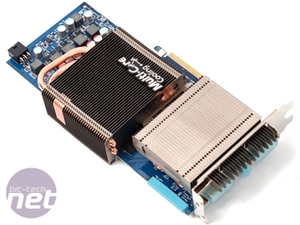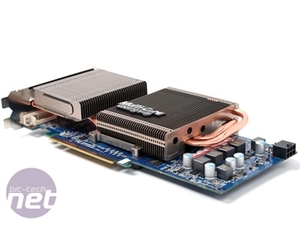Gigabyte Radeon HD 4850 1GB (GV-R485MC-1GH)
November 28, 2008 | 08:24

How we tested
As always, we did our best to deliver a clean set of benchmarks, with each test repeated three times and an average of those results is what we’re reporting here. In the rare case where performance was inconsistent, we continued repeating the test until we got three results that were consistent.The tests performed are a mixture of custom in-game timedemos and manually played sections with FRAPS to record the average and minimum frame rates. We strive to not only record real-world performance you will actually see, but also present the results in a manner that is easy to digest.
ATI Test System
Intel Core 2 Extreme QX6850 (operating at 3.00GHz – 9x333MHz); Asus Maximus Formula motherboard (Intel X38 Express with two PCI-Express 2.0 x16 slots); 2x 2GB Corsair XMS2-6400C5 (operating in dual channel at DDR2-800 5-5-5-12-1T); Seagate Barracuda 7200.9 200GB SATA hard drive; Enermax Galaxy DXX 1000W PSU; Windows Vista Home Premium x86-64 (with Service Pack 1); Intel inf 8.3.0 WHQL.Graphics cards
- Gigabyte Radeon HD 4850 1GB (GV-R485MC-1GH) - operating at 640/1,920MHz using Catalyst 8.10 hotfix 8-551-1-71310
- AMD ATI Radeon HD 4870 X2 2GB - operating at 750/3,600MHz using Catalyst 8.10 hotfix 8-551-1-71310
- Sapphire ATI Radeon HD 4850 X2 2GB - operating at 625/1,986MHz using Catalyst 8.11 beta
- AMD ATI Radeon HD 4870 1GB - operating at 750/3,600MHz using Catalyst 8.10 hotfix 8-551-1-71310
- AMD ATI Radeon HD 4870 512MB - operating at 750/3,600MHz using Catalyst 8.10 hotfix 8-551-1-71310
- AMD ATI Radeon HD 4850 512MB - operating at 625/1,986MHz using Catalyst 8.10 hotfix 8-551-1-71310
Nvidia Test System
Intel Core 2 Extreme QX6850 (operating at 3.00GHz – 9x333MHz); XFX nForce 780i SLI motherboard (with two PCI-Express 2.0 x16 slots); 2x 2GB Corsair XMS2-6400C5 (operating in dual channel at DDR2-800 5-5-5-12-1T); Seagate Barracuda 7200.9 200GB SATA hard drive; Enermax Galaxy DXX 1000W PSU; Windows Vista Home Premium x86-64 (with Service Pack 1); Nvidia 15.17 nForce drivers.Graphics cards
- Nvidia GeForce GTX 280 1GB - operating at 602/1,296/2,214MHz using Forceware 180.43 beta
- Nvidia GeForce GTX 260+ 896MB - operating at 576/1,242/1,998MHz using Forceware 180.43 beta
- Nvidia GeForce 9800 GTX+ 512MB - operating at 738/1,836/2,200MHz using Forceware 180.43 beta
Games Tested
- Crysis, version 1.21 (64-bit) with DirectX 10 and DirectX 9.0
- Far Cry 2, with DirectX 10/10.1 and DirectX 9.0
- Fallout 3, with DirectX 9.0
- Call of Duty 4: Modern Warfare, version 1.6 with DirectX 9.0

MSI MPG Velox 100R Chassis Review
October 14 2021 | 15:04










Want to comment? Please log in.